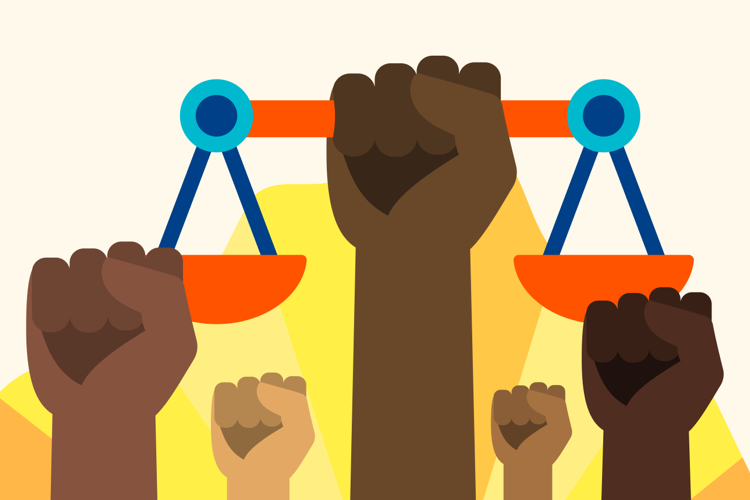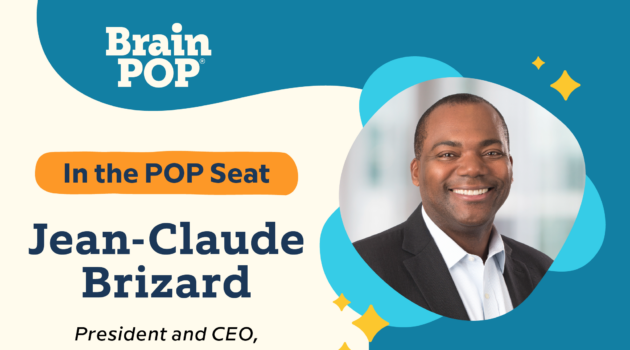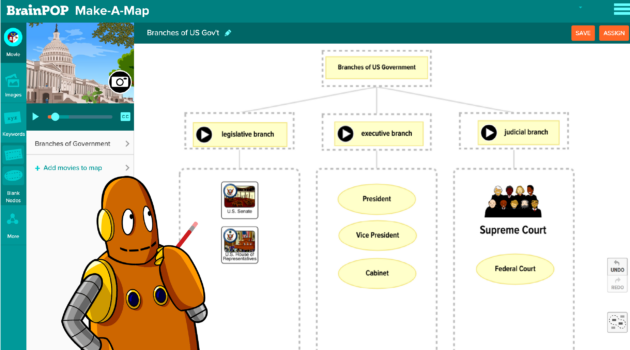Thought Leadership
Inclusion and Representation in BrainPOP Content

Editors’ Note: This article is updated regularly.
We believe it’s important to conduct regular critical reviews of our content to ensure diversity, equity, and inclusion. Research shows that kids benefit from seeing themselves represented in popular media and educational materials. It is validating and affirming, especially for kids from marginalized communities.
An inclusive curriculum prepares students to be participants in a vibrant and diverse democracy, by exposing them to a wide range of viewpoints, cultures, and identities. It helps cultivate values like open-mindedness, empathy, and cultural sensitivity.
As educators, we have an ethical responsibility to present topics accurately. This includes incorporating information and perspectives that standard narratives previously omitted.
We know we still have a lot of work to do. We consider the following topics a step in the right direction—but only the beginning.
We’ve increasingly prioritized new topics and revisions that highlight diverse stories and perspectives, and incorporate new scholarship. This effort includes diversifying the narrators who host our movies as well. Tim, Annie, and Ben now share the stage with four additional narrators: Nat, Cassie, Rita, and Mateo.
We know we still have a lot of work to do. We consider the following topics a step in the right direction—but only the beginning.
While this list is by no means exhaustive, here are some of the new topics and revisions that reflect our commitment to diversity, equity, and inclusion.
Browse Content
- Native American History and Culture
- Black History and Culture
- Asian-American and Pacific Islander History and Culture
- Latino History and Culture
- Women’s History
- LGBTQ+ History and Representation
- Disability History and Voices
- Jewish History and Culture
- Muslim and Middle Eastern History and Culture
- Representation in STEM
Native American History and Culture
- Navajo Code Talkers: Learn about the U.S. Marines who developed the lightning-fast and unbreakable code that helped the Allies to victory.
- Reservations: Discover how tribal sovereignty and treaty rights have shaped the unique status of Native nations and reservations in the U.S.
- Trail of Tears (revision): Trace the path of the brutal forced removal of the Choctaw, Cherokee, Chickasaw, Miscogee (Creek), and Seminole peoples from the Southeastern U.S.
- Native American Traditions (revision): Present an introduction and overview of Native peoples in what is now the U.S.
- Thanksgiving on BrainPOP and BrainPOP Jr. (revision): Discover the true story of the meeting between the Wampanoag nation and the settlers of Plymouth, deconstructing some common myths about Thanksgiving.
- Wounded Knee Massacre (revision): Understand how U.S. policy toward the Lakota laid the groundwork for the massacre.
- California Missions: Learn the story of the Spanish colonization of California and the subjugation of the Native peoples there.
- Pocahontas (revision): Get an updated look at one of our country’s best-known—and most mythologized—Native American women.
- Pumpkins: Discover the surprising history of the first plants domesticated by Native Americans.
- Powwows (coming soon): Experience the inter tribal gatherings where Native people celebrate their cultures through dance, and music.
We’ve been working with Native Studies advisor Kerri J. Malloy (Yurok/Karuk Tribes), a lecturer in the Department of Native American Studies at Humboldt State University. He has worked with us to revise and expand our Native America unit, as well as connecting us with experts and scholars from specific nations to consult on topics that touch on their stories.
We’re also incorporating Indigenous perspectives into U.S. history topics, particularly in the colonial and early American period. Recent topics include Building the Thirteen Colonies, Regions of the Thirteen Colonies, and Jamestown, Parts 1 and 2.
Black History and Culture
- Alvin Ailey: Meet the Black choreographer who revolutionized dance by celebrating African American culture on the stage.
- Hip-hop and Rap: Learn the history of hip-hop music and culture, from its humble beginnings in the Bronx, New York, to its popularity all over the world.
- Madam CJ Walker: Meet Madam C.J. Walker, the inventor and self-made businesswoman who may have been America’s first Black millionairess.
- Haitian Revolution: Introduce the story of the successful uprising of the enslaved people of Haiti, leading to the founding of the world’s first Black republic.
- Juneteenth: Trace the history of the holiday many call America’s “true Independence Day”—commemorating the end of slavery in the U.S.
- Tulsa Race Massacre: Discover the story of the Greenwood district of Tulsa, Oklahoma—a place of pride, opportunity, and achievement for its Black residents—that was destroyed by a mob in 1921, in one of America’s worst episodes of racial violence.
- Fannie Lou Hamer: Hear the story of the voting rights activist, created in partnership with the team behind the documentary Fannie Lou Hamer’s America.
- Black Lives Matter Protests: Explore the protest movement that has been fighting for racial justice for years, and which swept the world in the wake of George Floyd’s death.
- Women’s Suffrage (revision): Understand the history of the fight for women’s votes, including its roots in abolition and the key role played by many Black activists.
- History of Black History Month (coming soon): Introduce the annual celebration of Black American history, culture, and contributions with the story behind it.
Check out the entire Black studies unit on BrainPOP, which has been significantly expanded in recent years.
Asian-American and Pacific Islander History and Culture
- Allen Say on BrainPOP Jr.: Explore the life and work of the Japanese-American author whose inspirations include his own experiences and the cultures around him.
- Maya Lin: Get to know the life and work of the Chinese-American artist, whose design of the Vietnam Veterans Memorial in Washington, D.C., helped change the way the nation mourns.
- Japanese-American Incarceration: Learn the story of the imprisonment of more than 110,000 Japanese Americans during World War II.
- AAPI Heritage Month Interview with Dr. Feng Zhang: Meet Chinese-American biochemist Feng Zhang, whose work has been instrumental in the development of CRISPR, a revolutionary genetic engineering tool.
- AAPI Heritage Month: Celebrate the contributions of prominent Asian Americans and Pacific Islanders.
- Lunar New Year on BrainPOP and BrainPOP Jr.: Dig into the traditions of the holiday, with a particular focus on celebrations in China, Korea, and Vietnam.
- Queen Lili’uokalani: Hear the story of the last queen of Hawaii, and her overthrow at the hands of a group of American businessmen.
- Bruce Lee: Meet the martial artist, actor, and filmmaker whose life and career influenced countless action films, video games, and even hip-hop!
- Eugenie Clark: Dive into the life and work of the Japanese-American marine biologist, whose pioneering work on sharks inspired a new generation of women to enter the field.
Latino History and Culture
- RJ Palacio: Get to know the author of Wonder, a novel about a kid with facial differences that’s read in middle schools across the country.
- Sonia Sotomayor: Discover the inspiring life story of the first Latina Supreme Court justice.
- Día de Muertos: Trace the traditions and celebrations of the Mexican holiday, from its roots in Aztec times to contemporary observances in North America and around the world.
- Aztec Civilization (revision): Get to know the mighty Mesoamerican empire.
- The House on Mango Street: Introduce Sandra Cisneros’s novel, a modern coming-of-age classic.
- Latin Music (revision): Take a tour of some of the most popular styles of Latin music.
- Lin-Manuel Miranda: Meet the award-winning actor, composer, and lyricist best known for the smash-hit Broadway musical Hamilton.
Women’s History
- Queen Lili’uokalani: Hear the story of the last queen of Hawaii, and her overthrow at the hands of a group of American businessmen.
- Sonia Sotomayor: Discover the inspiring life story of the first Latina Supreme Court justice.
- Alice Ball: Meet the brilliant young scientist who developed the first effective treatment for leprosy.
- Mae Jemison on BrainPOP Jr.: Get to know the first Black woman to go to space and the work she continues today.
- Grace Hopper: Find out all about the computer science pioneer who forever changed the way we speak to computers and the role they play in our world.
- Wangari Maathi: Learn about the Kenyan biologist who started a movement—and won the Nobel Peace Prize.
- Rachel Carson: Get to know the scientist whose research helped launch the modern environmentalist movement.
- Eugenie Clark: Dive into the life and work of the Japanese-American marine biologist, whose pioneering work on sharks inspired a new generation of women to enter the field.
- Madam CJ Walker: Meet Madam C.J. Walker, the inventor and self-made businesswoman who may have been America’s first Black millionairess.
- Emily Dickinson: Examine the life of the celebrated American poet and the lines of her poetry, including her innovative use of imagery, figurative language, and slant rhyme.
- Zaha Hadid: Get to know the innovative Iraqi-British architect who was the first woman to win the Pritzker Prize.
- Anne Frank: Meet the young girl whose diary continues to touch readers around the world.
- Malala: Get to know the Pakistani girls’ education activist and human rights advocate, who received the Nobel Prize in 2017 at just 17.
- Pocahontas (revision): Get an updated look at one of our country’s best-known—and most mythologized—Native American women.
- Fannie Lou Hamer: Hear the story of the voting rights activist, created in partnership with the team behind the documentary Fannie Lou Hamer’s America.
- Nellie Bly: Follow the groundbreaking exploits of investigative reporter Nellie Bly, and learn how her work instigated public outcry and social reform.
- Salem Witch Trials: Find out the scary truth behind America’s most infamous witch hunt, when fear and panic spread through a Puritan society and a group of mostly older women, widows, and outcasts were accused of doing the devil’s work.
- Maya Lin: Get to know the life and work of the Chinese-American artist, whose design of the Vietnam Veterans Memorial in Washington, D.C., helped change the way the nation mourns.
- Women’s Suffrage (revision): Understand the history of the fight for women’s votes, including its roots in abolition and the key role played by many Black activists.
- RJ Palacio (Coming soon): Get to know the author of Wonder, a novel about a kid with facial differences that’s read in middle schools across the country.
Check out our Women’s History unit for more topics!
LGBTQ+ History and Representation
- Alvin Ailey: Meet the Black choreographer who revolutionized dance by celebrating African American culture on the stage.
- Pride Month: Interview with Ose Arhagan Get to know the young activist who’s working to make their community—and the world—a more inclusive and equitable place.
- Harvey Milk: Discover the story of the gay rights advocate who became one of the nation’s first openly gay elected officials, as the LGBTQ+ rights movement was beginning.
- Pride March at 50: Meet Ellen Broidy, a co-founder of the Christopher Street Liberation March, which evolved to become the annual Pride parades we know today.
- Personal Pronouns (revision): Dig deep into personal pronouns, with an inclusive approach to individual pronoun preferences.
- Alan Turing: Meet the British mathematician who helped develop code-breaking—and war-winning—technology in World War II. (Note: This topic mentions suicide.)
Disability History and Voices
- Disability Rights: Discover the story of the multi-week protest that secured the first civil rights law specifically protecting people with disabilities.
- Paralympic Games: Chat with two paralympians in honor of the 2022 Paralympic Games.
- Autism: Learn about autism spectrum disorder, featuring the contributions of animal scientist Temple Grandin, as well as climate activist Greta Thunberg.
- ADHD (coming soon, revision): Learn how ADHD affects people, and ways that ADHDers can find support and support themselves.
- Anxiety (coming soon): Identify key differences between healthy and disordered levels of anxiety, and learn ways to support yourself and others.
Jewish History and Culture
- High Holidays: Learn about Rosh Hashanah and Yom Kippur, the two holiest days in the Jewish calendar!
- Albert Einstein: Learn about the Nobel Prize-winning physicist who changed the way we view light, space, time, the universe…. Basically everything!
- Holocaust (revision): Discover how genocide can happen in an enlightened society.
- Anne Frank: Meet the young girl whose diary continues to touch readers around the world.
- Elie Wiesel: Get to know the author, humanitarian, and Holocaust survivor whose work earned him the Nobel Peace Prize.
- Judy Blume: Meet this beloved American author, whose books have touched the hearts of adults and kids alike since the 1970s.
- Passover (coming soon): Learn the story of Passover, the Jewish holiday that celebrates theIsraelites’ escape from slavery in Egypt.
Muslim and Middle Eastern History and Culture
- Zaha Hadid: Get to know the innovative Iraqi-British architect who was the first woman to win the Pritzker Prize.
- Ramadan: Learn about the history and traditions of Ramadan, the holiest month of the Islamic calendar, and a holiday celebrated around the world!
- Mansa Musa: Meet one of Africa’s best-known pre-colonial leaders, who built the Empire of Mali into a center of culture and learning in the Middle Ages.
- Malala: Get to know the Pakistani girls’ education activist and human rights advocate, who received the Nobel Prize in 2017 at just 17.
- Trans-Saharan Trade: Learn how the camel helped spur trade across the Sahara Desert in the third century, making Western Africa a major player on the world market.
- Spread of Islam (coming soon): Discover how the growth of the Medieval Islamic Empire made Islam the religion of millions in just a few hundred years.
Representation in STEM
- Alice Ball: Meet the brilliant young scientist who developed the first effective treatment for leprosy.
- Mae Jemison on BrainPOP Jr.: Get to know the first Black woman to go to space and the work she continues today.
- Hubble’s 30th Birthday: Chat with NASA Hubble engineer Morgan Van Arsdall and astrophysicist Dr. Quyen Hart in honor of the telescope’s 30th anniversary.
- Grace Hopper: Find out all about the computer science pioneer who forever changed the way we speak to computers and the role they play in our world.
- Wangari Maathi: Learn about the Kenyan biologist who started a movement—and won the Nobel Peace Prize.
- Rachel Carson: Get to know the scientist whose research helped launch the modern environmentalist movement.
- Eugenie Clark: Dive into the life and work of the Japanese-American marine biologist, whose pioneering work on sharks inspired a new generation of women to enter the field.
How do you incorporate questions of diversity, equity, representation, and inclusion into your lessons? How do you discuss potentially sensitive topics with your students? How has your approach changed over time? Do you have ideas for additional topics you want to share? We’d love to hear from you at feedback@brainpop.com.






